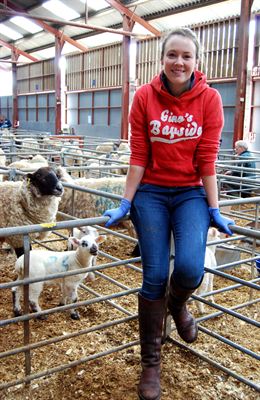Student research investigates ewe diets

Final year students at Harper Adams University hope to find out whether using home grown protein sources, such as rapeseed meal, affects ewe and lamb performance through an EBLEX sponsored trial.
Nutritional recommendations for ewe diets were developed around 50 years ago, yet much has changed in terms of breeds used, ewe weights, productivity and birth-weights. Currently,
there is a reliance on the use of soya bean meal - an expensive and imported protein source.
This project aims to provide evidence of how substituting some of the soya bean meal in ewe rations with protected home-grown protein sources can be done without affecting performance.
To conduct the trial, 48 twin-bearing ewes were allocated to diets of soya bean meal or rapeseed meal, and forage of either hay or straw.
The research, which will continue until 2015, has involved four undergraduate students at the university in Shropshire as well as PhD researchers and academic staff. The four students have recently submitted their initial findings following the completion of their stage of the trial.
Isobel Bowden from Henley on Thames is studying BSc (Hons) Agriculture. The 22-year-old has been investigating how altering the ewes’ diets can affect their milk yield and colostrum production.
She said: “The main purpose of the project is to see if rapeseed meal, which is widely grown in the UK, can be utilized effectively instead of imported soya bean meal in feed rations for sheep.
“This is to reduce the reliance on imported products so we can become more self-sufficient in our vegetable protein feeds, and also to help reduce greenhouse gas emissions by reducing imports. Forages were also looked at to see if there were interactions between them and the protein sources.
“My area of the trial was to look at the effect these protein sources had on milk quality and yield and subsequent lamb performance. At 16 hours after lambing, I milked the ewes out to measure the yield of the colostrum - the first milk given by an animal after birth to give vital nutrition to new-born lambs.
“I took samples and then milked the sheep again after 21 days to measure the milk yield and to again take samples.
“These samples were analysed in the teaching laboratory for fat, lactose, ash, protein, total solids and immunoglobulins. The lambs were weighed for the first four weeks after birth to see if the diets fed to the ewes had an effect on their performance in terms of weight.”
Also working on the project was Amie Gadd, 22 from Horley, Surrey. The BSc (Hons) Bioveterinary Science student, said: “My part of the project was to measure the faecal egg counts and evaluate the immune status of the ewes.
“This required taking faecal samples every two weeks to investigate the effects of diet on parasite burdens.
“So far, I have found that there is an affect with some of the diets, however further research is required to establish whether it is the amount of diet being fed to the ewes, or what they are being fed that is making a difference.”
22-year-old Laura Williams from Bromsgrove is studying BSc (Hons) Animal Science at Harper Adams. She said: “I measured how experimental diets affected metaboli status in the ewes.
“I was analysing for things such as urea, total protein, albumin, glucose, beta-hydroxybutyrate and non-esterified fatty acids.”
“We hope that this project will identify whether or not current nutritional standards adequately predict protein requirements”.
Also working on the project was John Brocklehurst, 23 from Macclesfield who compared the digestibility of the six diets used in the experiment.
ENDS
Janine M Heath
Press Office
Harper Adams University
01952 815428
Harper Adams University is the UK's leading specialist provider of higher education for the rural and land-based industries. Our mission is to deliver higher education and research for the delivery of a sustainable food chain and rural economy. To see how Harper Adams can help you, visit www.harper-adams.ac.uk
Tags:





